Personal social networks (4th post): birds of a feather flock together
Last updated on 19th June 2017
I've recently written three blog posts about relationships - "Personal social networks (1st post): Dunbar's 5-15-50-150 model", "Personal social networks (2nd post): the sympathy group & the full active network" and "Personal social networks (3rd post): assessing how we're doing". Towards the end of the second of these posts I said I particularly like the paper "Do birds of a feather flock together?" with its abstract stating "Cooperation requires that individuals are able to identify, and preferentially associate with, others who have compatible preferences and the shared background knowledge needed to solve interpersonal coordination problems. The present study investigates the nature of such similarity within social networks, asking: What do friends have in common?" The authors looked at similarity and emotional closeness for friends/acquaintances (not kin) in the sympathy group (contacted about monthly), in the active social network (contacted yearly), and in the total network (contacted every few years). The following eight slides, which illustrate their findings are downloadable here as a Powerpoint presentation, and downloadable here & here as a couple of four slide handout sets (probably best printed without the slide backgrounds).
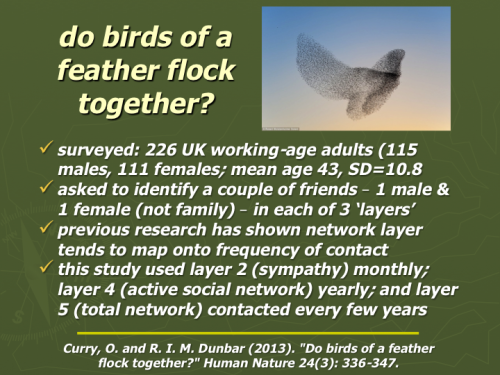
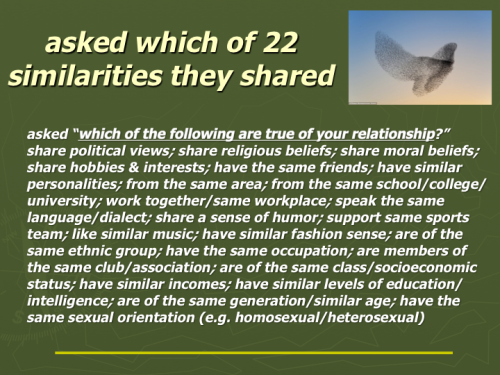
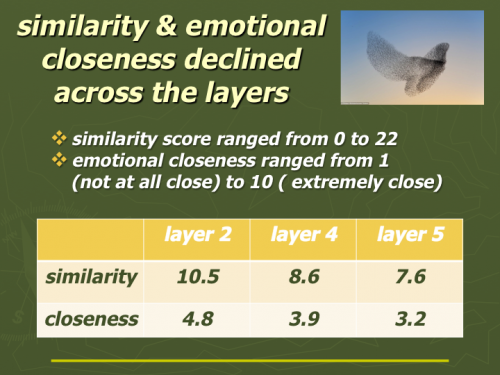
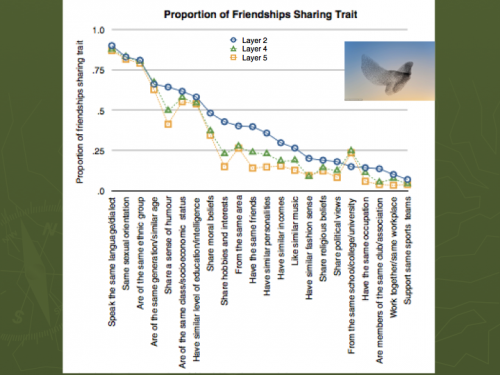
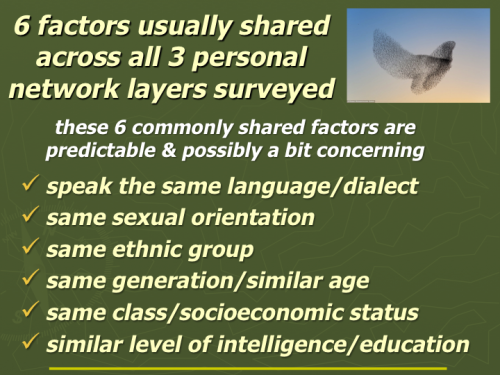



Very interesting. This research can help us be thoughtful about where we look for new contacts & which relationships we allocate bigger slices of our social time budget to. Note the importance of shared moral beliefs, hobbies/interests, personalities, taste in music, location/availability, and sense of humour for many closer relationships. Intriguingly a similar sense of humor may touch into shared values - see the paper "The encryption theory of humor: A knowledge-based mechanism of honest signaling" with its abstract describing humor " ... as a means of assessing shared underlying knowledge, attitudes, and preferences." Our attitudes, moods & behaviours powerfully affect those around us and we in turn are affected by them. Birds of a feather may flock together, but birds who flock together actually get to affect each others feathers - as Cervantes put it "Tell me what company you keep and I'll tell you what you are." I have written about these powerful social network ripples in the posts "Cooperative behaviour cascades in social networks" and "Be the change you want to see in the world" where I commented -
As the author Arehart-Treichel has put it - "The company you keep really does matter". Obviously we want to support people we know who are struggling with difficult emotions, unhealthy behaviours and even unhelpful ideas. It's very important though to be intelligent about who we are choosing to spend much of our time with. There is a real tendency to 'hang out' with others who are living in much the same way as we are. See, for example, studies on smoking and obesity ... One can find parallel effects for mood with people, who are unhappy, spending time with others in similar states e.g. the research "It takes three: selection, influence, and de-selection processes of depression in adolescent friendship networks". Relationships though are, in some ways, like nutrition. We want a large proportion of our diet to be healthy, if we ourselves want to flourish. Some relationships we have little choice over, or we may compassionately choose to be around somebody else who is struggling. Remember though "The company you keep really does matter".
Cicero, in his classic work “On friendship” emphasised the importance of a friend’s character. If we can, it's good to spend time with others who are caring, genuine, brave, even wise. It helps too if they practise sensible health behaviours (for example exercising well). These mutual relationship influences also extend to studying, to work practices and to the adoption of new ideas. It's probably the overall balance that matters, so the research "The spread of behavior in an online social network experiment" reported that "Individual adoption (of a behaviour) was much more likely when participants received social reinforce-ment from multiple neighbors in the social network". We don't want to be cruel or unkind, and it's fine – important – to have a mix of friends. Remember though, not only do "birds of a feather flock together", but how someone's "feathers" develop and change over time is powerfully affected by the other "birds" around them. Sobering. Exciting. We're permeable. We affect each other all the time, whether we mean to or not. So we have choices, and the choices are not just for ourselves. As Gandhi put it so truly and powerfully – "Be the change you want to see in the world."
The next post in this sequence is "Personal social networks (5th post): the frequency of conflict".
(The text of this post "Personal social networks: birds of a feather flock together" is downloadable as a Word doc or as a PDF file. While the 8 slides are downloadable here as a Powerpoint presentation, and down-loadable here & here as a couple of 4 slide handout sets - probably best printed without the slide backgrounds).
